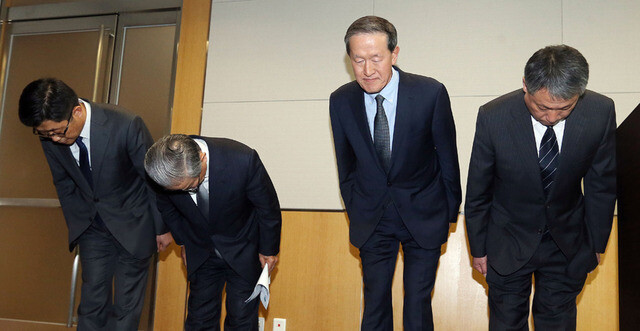hankyoreh
Links to other country sites 다른 나라 사이트 링크
[Editorial] Time for FKI to vanish into history

On Mar. 24, the Federation of Korean Industries (FKI) issued an apology to the South Korean public and a plan for reforms. Chairman Huh Chang-soo said he was “deeply sorry to have greatly disappointed the public with the unpleasantness of last year.” This comes six months after the FKI was revealed to have served as a fundraising channel for the Mir and K-Sports Foundations (which were run by Park Geun-hye’s confidante Choi Sun-sil). Not only does it feel very late in the game, but it’s also difficult to see it as a sincere apology when crimes of government-business collusion and support for government-organized demonstrations get lumped together under the label of “unpleasantness.”
FKI announced a change of its Korean name (its English name will remain the same), along with plans for reform through the elimination of government-business collusion, increased transparency, and a stronger think tank role. It is doing away with its chairman’s board meetings and setting up a management board of directors to handle decision-making, with the organization and budget to be cut by 40%. It’s also getting rid of the “social cooperation accounting” used to support government-organized demonstrations and beefing up the research duties of the Korea Economic Research Institute. FKI has talked about the “deep thought” it put into presenting a “reform plan that meets the public’s standards,” but what it gave us falls well short of what the public was hoping for. It’s clear it will only be able to do so much to end the deeply rooted practices of government-business collusion.
Its sincerity is also in question. This isn’t the first time FKI has apologized to the public or come out with a reform plan. It has pledged to “reflect and reform” every time a government-business scandal has erupted, including the former president Roh Tae-woo (1988-1993) slush fund case in 1995 and the Hannara Party (predecessor of the Liberty Korea Party) “cash truck” episode in 2002. In 2013, it instituted a “corporate management charter” amid widespread calls for economic democratization and chaebol reform. It pledged transparent, law-abiding management and shared growth, saying it would regard corporate ethics as a “paramount value.” FKI also said at the time that this was “a resolution for practical action beyond its simple declarative sense” - yet the result was nothing more than a declaration. This time around, Huh once again said the reforms “must be more than just words.”
It’s difficult to fathom FKI’s intentions in making more promises it doesn’t plan to keep while keeping its organization in place. The big groups that accounted for 80% of its annual dues - Samsung, Hyundai Motor, SK, and LG - have all left, joined by POSCO, KT, and the state-run banks. This domino effect of departures wasn’t the result of someone issuing orders. It’s been a case of member companies holding FKI accountable for hurting trust in business as a whole with its numerous illegalities and deviations.
With the Korea Chamber of Commerce and Industry and the Korea Employers Federation around, FKI’s disbandment wouldn’t create any problems in terms of representing business interests. FKI was born out of the coup d’etat of May 16, 1961. Now it’s time for it to vanish back into history.
Please direct questions or comments to [english@hani.co.kr]

Editorial・opinion
![[Editorial] Intensifying US-China rivalry means Seoul must address uncertainty with Beijing sooner than later [Editorial] Intensifying US-China rivalry means Seoul must address uncertainty with Beijing sooner than later](https://flexible.img.hani.co.kr/flexible/normal/500/300/imgdb/original/2024/0517/8117159322045222.jpg) [Editorial] Intensifying US-China rivalry means Seoul must address uncertainty with Beijing sooner than later
[Editorial] Intensifying US-China rivalry means Seoul must address uncertainty with Beijing sooner than later![[Column] When ‘fairness’ means hate and violence [Column] When ‘fairness’ means hate and violence](https://flexible.img.hani.co.kr/flexible/normal/500/300/imgdb/original/2024/0516/7417158465908824.jpg) [Column] When ‘fairness’ means hate and violence
[Column] When ‘fairness’ means hate and violence- [Editorial] Yoon must stop abusing authority to shield himself from investigation
- [Column] US troop withdrawal from Korea could be the Acheson Line all over
- [Column] How to win back readers who’ve turned to YouTube for news
- [Column] Welcome to the president’s pity party
- [Editorial] Korea must respond firmly to Japan’s attempt to usurp Line
- [Editorial] Transfers of prosecutors investigating Korea’s first lady send chilling message
- [Column] Will Seoul’s ties with Moscow really recover on their own?
- [Column] Samsung’s ‘lost decade’ and Lee Jae-yong’s mismatched chopsticks
Most viewed articles
- 1[Editorial] Transfers of prosecutors investigating Korea’s first lady send chilling message
- 2For new generation of Chinese artists, discontent is disobedience
- 3S. Korea “monitoring developments” after report of secret Chinese police station in Seoul
- 4[Photo] 1,200 prospective teachers call death of teacher “social manslaughter”
- 5[Exclusive] Unearthed memo suggests Gwangju Uprising missing may have been cremated
- 6[Column] Samsung’s ‘lost decade’ and Lee Jae-yong’s mismatched chopsticks
- 7[Column] When ‘fairness’ means hate and violence
- 8Xi, Putin ‘oppose acts of military intimidation’ against N. Korea by US in joint statement
- 9[Special reportage- part I] Elderly prostitution at Jongmyo Park
- 10[News analysis] Samsung in management crisis due to owner risk